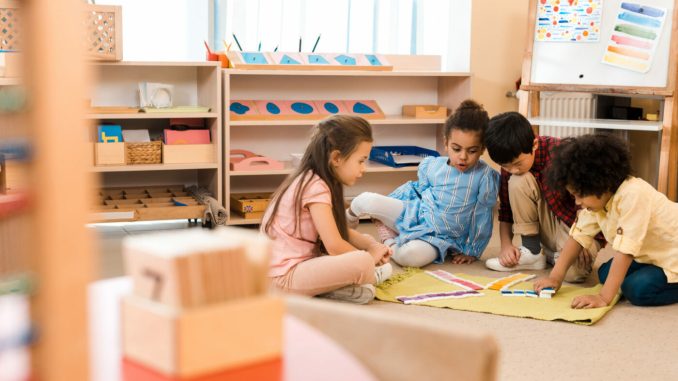
At present, the earlier one starts Essential teaching capacity should begin at birth. Infants begin learning from their first breath. Their 2 1 / 2 pound brain is like an elastic sponge just waiting to absorb any information you send its way. By the age of three, a child’s yearning to learn is as intense as hunger.
In recent years To date, most society understanding and practice of early childhood education grade is a few last years of schooling. Eventually children grow up and are society ‘s future builders. However, this process doesn’t begin just before they reach junior secondary; it starts when a baby is born!
In the early years of a child’s life we can count at A speed of emotional, cognitive, and social development. Educational experiences in this deeply formative phase will largely determine their subsequent success at work, social skills, and emotional well-being.
We should explore It is an early childhood plays a foundation role for lifelong learning and ought to know why this stage of education is critical investment and developing child ‘s sense mission.
These are now several main problems faced by modern society in promoting the development of young children. Children often steal, get into fights and have other conflicts with the law more frequently than any other age group. In addition, Western societies are increasingly rich, but children are far poorer than their old Starting at an earlier stage of life would eliminate many of these problems before they start.
The Importance of Early Childhood EducationConsistently, research shows that high-quality early childhood education can have a significant impact on a child’s future. According to the National Institute for Early Education Research ( NIEER ), children who participate in quality ECE programs get better grades, are more likely to finish school, and possess greater social skills than their peers Who do not have this experience.
Cognitive Development
Early childhood experience is an invaluable period for the development of cognition. During these years, children’s brains are incredibly molded and they will make millions more connections than an adult brain in the same amount of time ECE programs designed to stimulate curiosity, problem-solving ability and critical thinking can not but serve to perfect a person’s intelligence. Such activities as storytelling, interactive play and exploration induce children into a highly analytical way of thinking and provide the rudimentary skill necessary for their entire life’s academic growth.
Social and Emotional Skills
One of the founding blocks in early childhood education is social and emotional learning. Kids gradually pick up social skills such as empathy, cooperation and peace-making from playmates and teachers around them; emotional control; self-awareness of what makes them tick while also knowing that, by controlling themselves, they can bring about good relations with society.
Language and Communication
Among the four aspects of early childhood education, language development has a pivotal position. The enriching force of rich and varied vocabulary, storytelling or communication can help children speak well. Children who hear more words spoken to them in their early years tend to perform better in school and have higher academic achievements, according research from the research unit of the American Academy of Pediatrics. Therefore, ECE programs emphasizing language development encourage children to become strong speakers and eager learners throughout life.
Physical Development
Kids need physical development from an early age. That is, they require activities such as fine and gross motor skills–such as making things with their hands or even using the big carpentry sets outside; these contribute to children ‘s overall health and well-being. A firm physical development foundation ripples through to promote cognitive and social progress: active children also perform better in school; they engage in more positive behavior than their more passive opposite numbers do.
The Role of Educators and Caregivers
In early childhood education, educators and caregivers play vital roles both inside and outside the classroom. Their interactions with students, the ways they are and models set for them are critical to children. To keep abreast of new knowledge or methods, and to create an environment of study that is favorable for learning activity, professional development for teachers is essential.
Parental Involvement
The second key to early childhood education is parental involvement. Parents who get involved educate their children, attending educational events at home or school, and speaking with their teachers, are of great help for their child. programs that give resources and guidance to parents help form a true “home-school ” alliance, greatly increasing the effectiveness of ECE.
Investment in Early Childhood Education
Investing in early childhood education benefits not only the individual children involved but also society as a whole. High-quality ECE programs alleviate the need for special education, hold down crime rates, and make the workforce more efficient. In the end everyone benefits: that is what governments and communities which pay attention to really doing something about early childhood education are aiming at.
Ending Chapter
Because early childhood education is placed as a foundation for life-long learning and structure in society, so We can install a fresh appearance on the world. By providing healthy cognitive, social, and other experiences for children now–and then following through with them beyond these years–ECE programs lay down the grassroots that lead up to future achievements of health. Because we now realize the importance of this period, not only support but also extension of early childhood education therefore should be a first priority for those in charge–that is, families. But it is work that has to be done slowly and surely, even though this book showed that investment in this area ultimately benefits not only individual children but society as a whole, using numerical justifications, other forms of evidence and historical interpretation. When you reduce cogitation on it to tangible reality it means setting a better course for everyone s future.
Leave a Reply